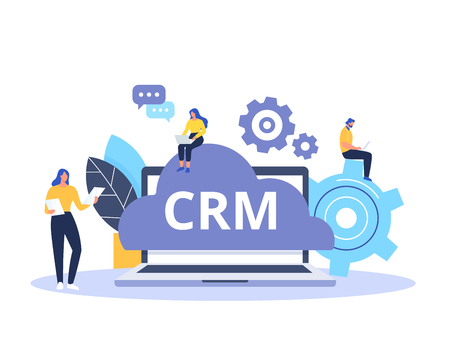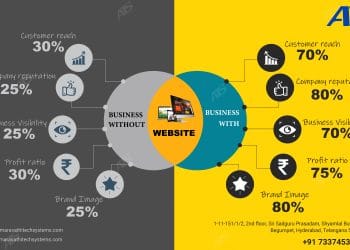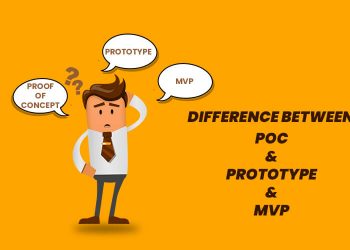CRM covers your contacts and clients. It covers your ties. It includes leads who just know the name of your business and your most loyal customers.
CRM software allows you to maintain ties with a targeted framework and maintain everything in one location. Many of these systems have been equipped with user-friendly interfaces that can even be used by most novice users.
Here are 6 good reasons you need CRM Agencies
1. They will help you select the right CRM system
It will be overwhelming to choose a CRM device. 100s of systems can be selected, literally. The various functions and features of each device are different. Some of them are difficult to use, while others are easy to use and suitable for beginners. Do you want a solely CRM emphasis or do you also want a sales and marketing integration system?
The various channels available for a CRM agency would be well versed. They will evaluate your needs and advise your company on the best platform.
2. You can focus on the parts of your business that are most important to you
You began your company because you loved the product or service you provide. A CRM agency specializes in CRM during your training. When you work with a CRM agency, your needs can easily be understood and an effective CRM plan implemented. Your skills and experience will help you manage your CRM easily, while you concentrate on what is important to you in your company.
3. They will save you time on training and legwork
Most platforms need basic training at least so that you can use it effectively. This includes a certain amount of investment from you. You may however remove much of the need for training if you decide to work for an organization. In operating a platform several CRM agencies are going to take over. A CRM organization may provide assistance and training if you want to run the system itself, either partially or wholly.

4. They have a thorough understanding of the customer lifecycle
Every company has a different customer life cycle, but almost every customer life cycle has inconvenienced. You will take advantage of a new viewpoint while working with a CRM organization. CRM experts will look with fresh eyes at and evaluate the customer life cycle and find any pitfalls. Their skills and experience will allow you to help you improve your life cycle to see more strangers converted into leads and more leads to long-term customers.
5. They will help keep your sales process streamlined from start to finish
As a small company, your resources will probably be expanded, and your sales process does not receive your due attention. With an onboard CRM department, you will make sure that all of the sales processes are streamlined and consistent from start to finish. Your contacts will also receive a clear business experience, whether they are emerging business leaders or long-standing customers.
6. A CRM agency will help you bridge the gap between sales and marketing
Sales and marketing are often approached separately, but the importance of bridging the gap between them is recognized by CRM professionals. The bridging of the sales and marketing divide reduces and aligns the competitiveness of teams. CRM is essential for your business but can require years of experience. Working with a CRM agency will allow you to concentrate on those aspects of your business that you love while making sure that the experts manage the CRM of your company.
What’s impacting the industry today?
From the brand/client perspective:
- In-house design teams are developed by brands like Unilever and United Airlines, which enables agencies to switch from long-term contract models to short-term project work.
- Brands don’t just want to partner with innovative specialist companies. You want to partner with niche agencies who understand your market and have deep business experience.
- The consumer today determines which brands to be provided and companies expect agencies to develop customer data-centered campaigns (i.e. based on customer needs). This ensures that agencies have been more technological and customer-compatible.
From the agency perspective:
- The sudden rise of businesses providing advertisement and marketing services to brands from private consultants to small agencies.
- Not only do the agency fees fall, but the morale and productivity of employees are also being affected by overwork.
- Inside agencies, greater focus is put on making the whole customer experience more visible across teams. Also, there is increased attention to measure the effectiveness of campaigns, improve productivity and save time and money.
Although ideas may generate awareness for agencies, they must concentrate on three primary aspects to remain relevant, to be outstanding on the market, and to develop their businesses:
- Increasing employee productivity and efficiency.
- Improving the quality of client relationships.
- Internally, drive more process and accountability into their everyday workings.
Here’s a step-wise guide into how CRM can benefit agencies immensely
#1 Set context when engaging with your prospective clients
You get leaders from different outlets, through your networks, referrals, meetings, webinars, social media marketing campaigns, sales camps, or even in some cases your website.
What are all these lead data doing? All lead data can simply be saved and accessed at all times in a CRM. The silver lining is that some CRM software has the potential to enhance lead data automatically by accessing data from the lead’s social profiles and public records. Even better, a good CRM program is even fitted with a web or application monitoring function that gives you insights into your visited sites, analysis reports, webinars, blogs you have visited, or more. This could be a strong tool that allows you to contextualize your first few commitments.
#2 Easily catch up where you left last
One of the best things about implementing a CRM advertisement and commercialization is that it allows you to display each client data in a single location at 360 degrees. It is incredibly easy for you to know where you have left the client last because any email or call you have had is stored in one single location, the meetings you have fixed with them, the notes you have added on their company and their specifications, and even any file that you have shared such as business planning presentations or slots. It’s much better than scrolling your emails, calling logs, and notebooks to keep a record of each lead, isn’t it?
Some modern CRM program helps to pick you up. For example, if the lead replied to your email, you can set requirements, like 10 points, or 20 points from a specific field or more. You should then follow certain guidelines which are more relevant for your company and follow those who are involved with you more actively.
#3 Track everything related to your business in simple steps
As an organization, you should have several systems, one to monitor progress with prospective customers, one to monitor project status with current customers, etc. While a team of account managers can keep track of progress and deadlines, it still requires a lot of manual work.
You can use a CRM advertisement and marketing software to the best possible advantage here, by just building many deal pipelines for every case of use. It is easy to drag and drop a customer from one step to the next and even produce sales figures and get an overview of how many customers are present at each point.
For example, if you still have a lot of customers “contacted,” it may be that the customer is not looking to switch from his existing agency for the next few months or that they are also investigating your competitors. The reason for this could be because you are still in contact with your marketing team. In that case, you should envisage sales cadence tactics to pursue your future customers.
#4 Work smart. Save time.
Let’s admit it. Let’s admit it. Life in an agency is insane. You almost always coordinate customer expectations and meet project deadlines. More so now, as agencies rely more on short-term ventures, i.e. jobs and shorter time frames. Is there a way in which the number of manual activities you perform can be reduced, just so you can spend time concentrating more on your customer? Yeah, the answer! CRM promotion and marketing enables you to automate a wide array of everyday worldly activities such as raising invoices, establishing payment reminders, sending a note of thank you when a customer subscribes to the newsletter, etc.
#5 Collaborate across teams
Some agencies will have the account manager themselves handle end-to-end customer relations, from coordination of their project specifications to invoice and payment management. In several instances, agencies can be made up of several departments, such as the business development team, the account management team, and the customer management team. How do teams work to stay with a specific client on the same page?
Some CRM marketing and advertisements come with teamwork functions that prevent teams from going back and forth between various information-sharing tools. For example, if a customer for an ad agency asks the account management team for an ad created by the management team, the account management team will retrieve the answer to the customer’s inquiry into the respective team member from the production house and send the customer the information.
#6 Keep your clients engaged at all times
Here you can find a different statistic. Capterra says businesses using CRM found that customer retention and satisfaction increased by 47 percent. What does it mean? What does it mean? Naturally, more company. Your chances of referral are also increased.
One way to keep your customers happy is to ensure that you remain up-to-date. You can’t take a back seat after you have secured a customer. This momentum must be maintained. As Aaron Levy, Elite SEM Director Paid quest, puts it, “being your best friends is one of the main ways to keep your customers committed. Learn how to get your birthdays, the names of your children, and most of all!” You can joke apart, by introducing your customers to your nutrition campaigns.
Send invitations to events, send them new service updates, share ideas that you have collaborated with other customers which may be useful, interesting, or more important. In reality, you can also monitor your clicks and see how your campaigns work, and change your strategy.
#7 Work on the go
That’s what you heard. Software that can be accessed through mobile ads and marketing can change games for your business. You can access customer info, respond to emails, make calls and log in to your CRM and still keep up-to-date with your company no matter where you are.
Modern CRMs are now filled with several features to contribute to the success of the business. Your CRM standard will now recognize sales opportunities, support lead prospecting, and assist with the management of all kinds of operational data.
That means that you would change that now if your agency doesn’t already use a CRM.
What this does not mean, though, is you must use the same company CRMs as Fortune 500 firms.
You need a CRM that operates to meet the basic needs of the company and not everyone else as a small to medium-sized organization. With 43% of CRM customers using less than half of their CRM features, many companies waste money on bloated software that does not respond to their special requirements.
To ensure that your new CRM suits your agency, here are the top six items to look for.
1. Flexibility
The first thing you can look for in a CRM is that it is strong enough to meet all your needs and meet your company’s potential challenges.
As the size of your agency is highly scalable, the right CRM can help you keep track of new leads and help you with the operational capabilities of your company. Otherwise, you might rely on a CRM that prevents your company from growing.
If you choose a CRM, first take a look at what kind of functionality your agency needs today and what you will most definitely need in the future. See what kind of integrations it supports and how it suits what you use.
2. Communication
Although a CRM’s primary emphasis is on managing the relationship between the Organization and its customers, the best CRMs boost contact in the company itself.
Consider the ability to enable contact between your team members when selecting a CRM for your organization. For example, your CRM should help your team members to access all the information they need on customers and prospects, including the stage of their customer journey and the challenges they face—without having to hop between several windows and programs.
3. Ease of adoption
Although a CRM’s primary emphasis is on managing the relationship between the Organization and its customers, the best CRMs boost contact in the company itself.
Consider the ability to enable contact between your team members when selecting a CRM for your organization. For example, your CRM should help your team members to access all the information they need on customers and prospects, including the stage of their customer journey and the challenges they face—without having to hop between several windows and programs.
Be careful how the CRM blends with the current processes and procedures and the user experience. A duration of adaptation is necessary to implement every new technology or method in a company as and one finds out new best practices.
4. Email marketing
The ability to endorse email marketing is a must for any CRM. If you create drip campaigns or develop your eMail templates, each modern business should be aware of the importance of email marketing – your CRM should actively support all your Email Marketing efforts!
Almost every CRM should be capable of reading, managing, and sending email in itself, helping your team prevent the copying and pasting of text between CRM and your email client from wasting time. It would also be beneficial if CRM can provide useful data, such as open and click-through rates, to your sales and marketing team to better refine your email marketing activities.
5. Automation
CRM’s ability to help an organization simplify its processes and workflows every day is a crucial advantage.
You will significantly improve your agency’s performance and productivity by incorporating automation. The average salesman is currently wasting a fifth of his time with manual and administrative activities. It’s a lot of time and effort to work and doesn’t take the needle forward aggressively.
The reference marketing process is a basic sales routine that a CRM can automate. Rather than keep tabs on particular customers with a dealer or account manager, and whether they are ready to refer, this can be done automated. This is not possible.
6. Insightful data
A CRM that offers data-driven solutions should be provided by any organization. Your customers want to see the figures, after all.
Invespcro says marketers who use data-driven marketing campaigns have an average ROI five times higher than those who have no marketing expenses. It is particularly critical, therefore, that your CRM is capable of providing you with the data you need for better and more informed decision-making.
Benefits of CRM software for a different type of industries
For any company that wants to expand substantially, a CRM program has nearly become necessary. A CRM aims to build and transform engaging relationships with potential customers. This process of conversion from a produced lead to a full customer can be very complex and impressive for the sales team. Therefore, many companies adopt a CRM framework for maximizing efficiency in their companies. The majority of CRMs can be tailored to any kind of industry and are adaptable to the business owner’s requirements.
Here are the various benefits of CRM software for different types of industries. ·
- Hotel industry
Instant mobile notification of paths, sending reminder mail via pre-set templates, and creating invoices with one click can be auto-assigned from multimedia requests to designated staff.
- Travel Industry
A travel company needs to consolidate and allocate leads to different networks to teams to turn leads into customers. Access customer contact knowledge to best represent customers.
- E-Commerce industry
Self-assign tickets and monitor every ticket’s real-time status to encourage liability. Your fingertips help the customer information team provide streamlined solutions. To maximize your scope, manage promotional campaigns via emails and SMS.
- Healthcare Industry
Patient history, scheduled appointments, terminated appointments, and records of diagnosis are readily available to better support patients. CRM offers the means to increase the productivity of the health sector.
- Education Industry
To provide accurate education support, access student profiles and quick solutions through live chat, help link students to a smooth educational experience. Drastically decrease admission cycles through CRM.
- Real Estate Industry
Consolidate and automatically appoint sales team leaders, inquiries from different sources. Run initiatives to broaden online advertising, TV, printing, radio, etc. Manage inventories and submit invoices accurately when handling key documents and agreements.
- Airlines Industry
A personalized booking system front design improves direct conversions from different sources. Easy access for more successful marketing campaigns to data collected from various booking levels. Integrate easily into your existing PSS systems.
- FMCG industry
Creates multi-level SKUs product catalogs and adds product descriptions and payments to the media collection. Enable local agents to use the mobile app to access information in real-time. Keep your customers informed about deals and schemes promptly. Add new orders and receive payments with real-time alerts while tracking order status.
- Pharmaceutical industry
Learn about your medications and demand in a valuable way. Start marketing campaigns and organize the target client groups such as doctors and medical institutions. Structure internal processes and establish profitable partnerships with your customers to achieve a competitive advantage in your industry.
- Media Industry
Track output with customized parameters via growth graphs and reports. Monitor the success of employees and gain insights into their work. Check your latest activities to manage budgets and get estimates for your media advertisement predictions.
- Banking Industry
Get insights into the individual viability of customers by analyzing personal interests. Manage, assess and monitor potential opportunities as potential leads are gained. Access useful metrics and customer asset knowledge so that your questions can be better solved.
- Retail Industry
Manage and access all your orders from different outlets from a single CRM inbox. Simplify the order method and save time and money. Track progress in order payment and classify it in prepayment, partial payment, and payment at the time of delivery, etc.
- Cruise Management
Consolidate all inquiries into one dashboard to make quick access to all collection activities automated. Obtain insights into reservation sources and improve sales efficiency. Manage bookings and make sure every client has an uncomfortable experience.
- Service Industry
Create customer profiles by collecting simple profile details so that the support team can better represent customers. Track the team’s experiences and measure customer satisfaction rates at converter rates. Smooth the service process by providing a solid foundation and leading the team to make more money. This enables us to conclude that a CRM is vital to any enterprise that is driven to provide a streamlined service while growing workers’ productivity actively. A CRM is a powerful tool in which every business, regardless of industry, should invest.
Bottomline
CRM agencies are, above all, data experts with extensive marketing technology (MarTech) expertise that allows your brand the smooth transfer of data into and from CRM systems from multiple environments. CRM organizations will have the opportunity to properly measure all of the results of this operation. This gives the customer a complete perspective, creates useful insights, and informs the decision-making process guided by data.
A CRM agency bridges the gap between marketing strategy, technology, and performance, and helps you determine breakthroughs in communication, internal processes, and even past marketing efforts.












